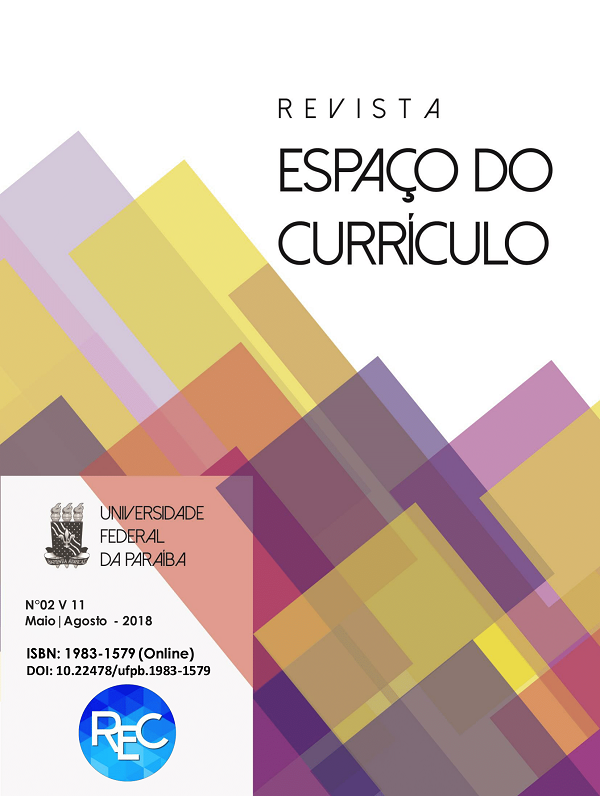CURRICULUM AND INCLUSION POLICIES WITHOUT CONTEMPORARY CONTEXT
from disciplinary companies to holding companies
DOI:
https://doi.org/10.22478/ufpb.1983-1579.2018v2n11.38611Keywords:
Disciplinary societies, Control companies, Inclusion, CurriculumAbstract
This essay aims to discuss the transformations proper to neoliberal policies, in the cultural and semantic field, due to the fact that they institute new ways of being, of being and relating in society. He observes that the realization of a given reality is first established in the order of the speeches, to later materialize with truth effects, thus producing forms of subjection. It analyzes the transition from disciplinary societies to control societies and their implications for curricular policies, which have been conducted in order to effect a standardization process, and the inclusion policies of a universalist nature, which have been propagated as a necessity, a human rights issue. It points to inclusion policies and curriculum policies as biopolitical devices at the service of the safety of populations that, when they feel included in groups and in official records, become easy targets for State actions. It infers that the implications of these policies for the school are evident in the gathering of many sad existences, both of students and teachers, in the teacher-centered monologism, in the production of various diseases, in the sad passions, in the new tolerance that covers the existing fascisms. Based on these issues and from the perspective of the transition from disciplinary societies to control societies, it discusses inclusive policies and curricular policies as a possibility of affirming the singularities and differences in school as life, as an event, as becoming, as chance.
Downloads
Metrics
No metrics found.
References
BRASIL. Base nacional comum curricular: versão preliminar – segunda versão revista. Brasília: MEC, 2016.
BRASIL. Base nacional comum curricular: versão preliminar – terceira versão. Brasília: MEC, 2017.
BRASIL. Base nacional comum curricular: educação é a base – quarta versão. Brasília: MEC, 2017a.
CERTEAU, Michel. A cultura no plural. Campinas: Papirus, 1995.
CÓSSIO, Maria de Fátima. Base comum nacional: uma discussão para além do currículo. Revista e-Curriculum, São Paulo, v. 12, n. 3 p. 1570-1590 out./dez. 2014.
DELEUZE. Gilles. Diferença e repetição. Rio de Janeiro: Graal, 2006.
FOUCAULT, Michel. Microfísica do poder. 7. ed. Rio de Janeiro: Edições Graal, 1988.
FOUCAULT, Michel. Vigiar e punir: nascimento da prisão. 25. ed. Petrópolis: Vozes, 2002.
FOUCAULT, Michel. Nascimento da biopolítica. São Paulo: Martins Fontes, 2008.
FOUCAULT, Michel. Segurança, território e população. São Paulo: Martins Fontes, 2008a.
FOUCAULT, Michel. Arqueologia das ciências e história dos sistemas de pensamentos: ditos e escritos II. Organização e seleção de textos por Manuel Barros da Motta. Tradução de Elisa Monteiro. 2. ed. Rio de Janeiro: Forense Universitária, 2005.
FREITAS, Helena Costa Lopes. Formação de professores no Brasil: 10 anos de embate entre projetos de formação. Educação & sociedade, Campinas: Cedes, v. 23, n. 80, p. 137-168, 2002.
FREITAS, Luiz Carlos. Habilidades socioemocionais e organização escolar. Disponível em: https://avaliacaoeducacional.com/2017/01/18/habilidades-socioemocionais-e-organizacao-escolar. Acesso em: 19 jan. 2017.
FREITAS, Luiz Carlos. BNCC: como os objetivos serão rastreados. Disponível em: https://avaliacaoeducacional.com/2017/04/07/bncc-como-os-objetivos-serao-rastreados/. Acesso em: 11 abr. 2017.
GUATTARI, Félix; ROLNIK, Sueli. Micropolíticas: cartografias do desejo. 4. ed. Petrópolis: Vozes, 1996.
LAZZARATO, Maurizio. As revoluções do capitalismo. Rio de Janeiro: Civilização Brasileira, 2006.
LAZZARATO, Maurizio. O governo das desigualdades: crítica da insegurança neoliberal. São Paulo: EdUFSCar, 2011.
LAZZARATO, Maurizio. Signos, máquinas, subjetividades. São Paulo: Edições Sesc São Paulo, 2014.
LOCKMAN, Kamila. Medicina e inclusão escolar: estratégias biopolíticas de gerenciamento do risco. In: FABRIS, Eli Terezinha; KLEIN, Rejane Ramos. (Org.). Inclusão e biopolítica. Belo Horizonte: Autêntica Editora, 2013. (Coleção Estudos Foucaultianos).
LOPES. Maura Corcini. Políticas de inclusão e governamentalidade. Educação & Realidade, v. 34, n. 2, p. 13-19, 2009. Disponível em: http://seer.ufrgs.br/index.php/educacaoerealidade/article/view/9725/5532. Acesso em: 8 nov. 2016.
MACEDO, Elizabeth. Base nacional comum para currículos: direitos de aprendizagem e desenvolvimento para quem? Educação e Sociedade, Campinas, v. 36, n. 133, p. 891-908, out./dez. 2015.
MENEZES, Eliana da Costa Pereira. A maquinaria escolar na produção de subjetividade para uma sociedade inclusiva. 2011. Tese (Doutorado em Educação) – Programa de Pós-Graduação em Educação, Universidade do Vale do Rio dos Sinos, São Leopoldo, 2011.
RECH, Tatiana Luiza. A inclusão educacional como estratégia biopolítica. In: FABRIS, Eli Terezinha; KLEIN, Rejane Ramos (Org.). Inclusão e biopolítica. Belo Horizonte: Autêntica Editora, 2013. (Coleção Estudo Foucaultianos).
SILVA, Tomaz Tadeu. O projeto educacional da “nova” direita e a qualidade total. Universidade e Sociedade, Brasília: Andes, ano VI, n. 10, p. 82-89, jan. 1996.
SILVA, Tomaz Tadeu. Documentos de identidade: uma introdução às teorias do currículo. 2. ed. Belo Horizonte: Autêntica, 2001.
SHIROMA, Eneida Oto. A outra face da inclusão. Teias, Rio de Janeiro, ano 2, n. 3, jan./jun. 2001.
VEIGA NETO, Alfredo.; LOPES, Maura Corcini. Inclusão e governabilidade. Educação e Sociedade, Campinas, v. 28, n. 100, p. 947-963, out. 2007.
Downloads
Published
How to Cite
Issue
Section
License
By submitting an article to Curriculum Space Journal (CSJ) and having it approved, the authors agree to assign, without remuneration, the following rights to Curriculum Space Journal: first publication rights and permission for CSJ to redistribute this article. article and its metadata to the indexing and reference services that its editors deem appropriate.
















